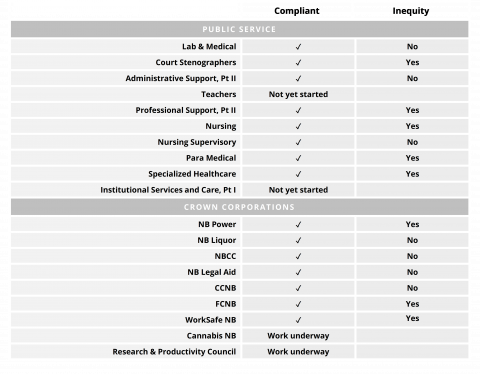Moncton — June 19 marks the 15th anniversary of the Pay Equity Act, 2009, a pathbreaking law ensuring pay equity in New Brunswick's public sector.
The Act redresses gender-based discrimination experienced by employees in women-dominated jobs so they receive equal compensation to men-dominated jobs of comparable value. It applies to parts I (government departments), II (school system), and III (hospital sector) of the public service, as well as to Crown corporations.
“The Pay Equity Act, 2009 was essential to help correct the historical devaluation of women-dominated jobs and the resulting pay inequity for employees. The Act was a significant step forward in reducing the gender wage gap nearly by half (from 13.3 per cent in 2009 to 7.4 per cent today) and in helping to make New Brunswick a more just and equitable province,” says Johanne Perron, the Coalition Executive Director.
Wage adjustments in the millions of dollars revealed the extent of pay discrimination in the public sector. In the 15 years since the Act received Royal Assent, the majority of job classifications and Crown corporations subject to the Act have completed an initial pay equity assessment.
Susie Proulx-Daigle, the President of the New Brunswick Union (NBU) agrees: “Value is a term I hold dear when it comes labour. Workers’ value is often minimized by employers and those in positions of power, even more so when it comes to women. Being paid less because of gender has always been wrong, but that doesn’t mean the problem would fix itself. The Pay Equity Act was a tremendous step forward in the fight for equal pay for equal work. Fifteen years since its inception, we’re still fighting to level the playing field, but many of the gains made can be tied to this historic piece of legislation.”
While meaningful progress was achieved in the public sector, the right to pay equity is not yet assured for the 60% of working women employed in the private sector. Shawn Graham's Liberal government stated when the Act was first passed that the government needed to "get its house in order" before extending pay equity to the private sector. It’s long past time to do so, and New Brunswick women and unions agree.
“The Pay Equity Act, 2009 was a landmark success for labour in New Brunswick, and its legacy carries through today,” said Renée Boudreau, 2nd Vice-President of the New Brunswick Nurses Union (NBNU). “As a profession where women make up most of the workforce, it is important for nurses to be part of the continuous struggle and lend our voice for other female professions to have pay equity.”
At the federal level, the Pay Equity Act was enacted in 2021 and applies to the federal public service, parliamentary workplaces and federally regulated private employers such as banking, telecommunications and interprovincial transportation. This is a sobering reminder for workers in New Brunswick's provincially-regulated private sector as well as municipalities, universities and the community care sector: your right to pay equity is being denied.
“Ontario and Quebec passed pay equity legislation for the private sector over three decades ago, and not a single business reported closing its doors as a result. CUPE-NB believes that New Brunswickers deserve the same right as their neighbours. And since women represent nearly half of the workforce, let's make sure they're paid for that heavy lifting by extending pay equity to the private sector,” added Steve Drost, Canadian Union of Public Employees (CUPE) President.

